What a wonderful surprise to discover that renowned author Michael Pollan was slated to speak at Book Passage in Corte Madera, which is recognized as the Bay Area’s liveliest bookstore, most notably for book launches and signings. Pollan’s latest book, This is Your Mind on Plants, (which is available over on Amazon), is a new way to think about drugs and humanity’s attraction to psychoactive plants.
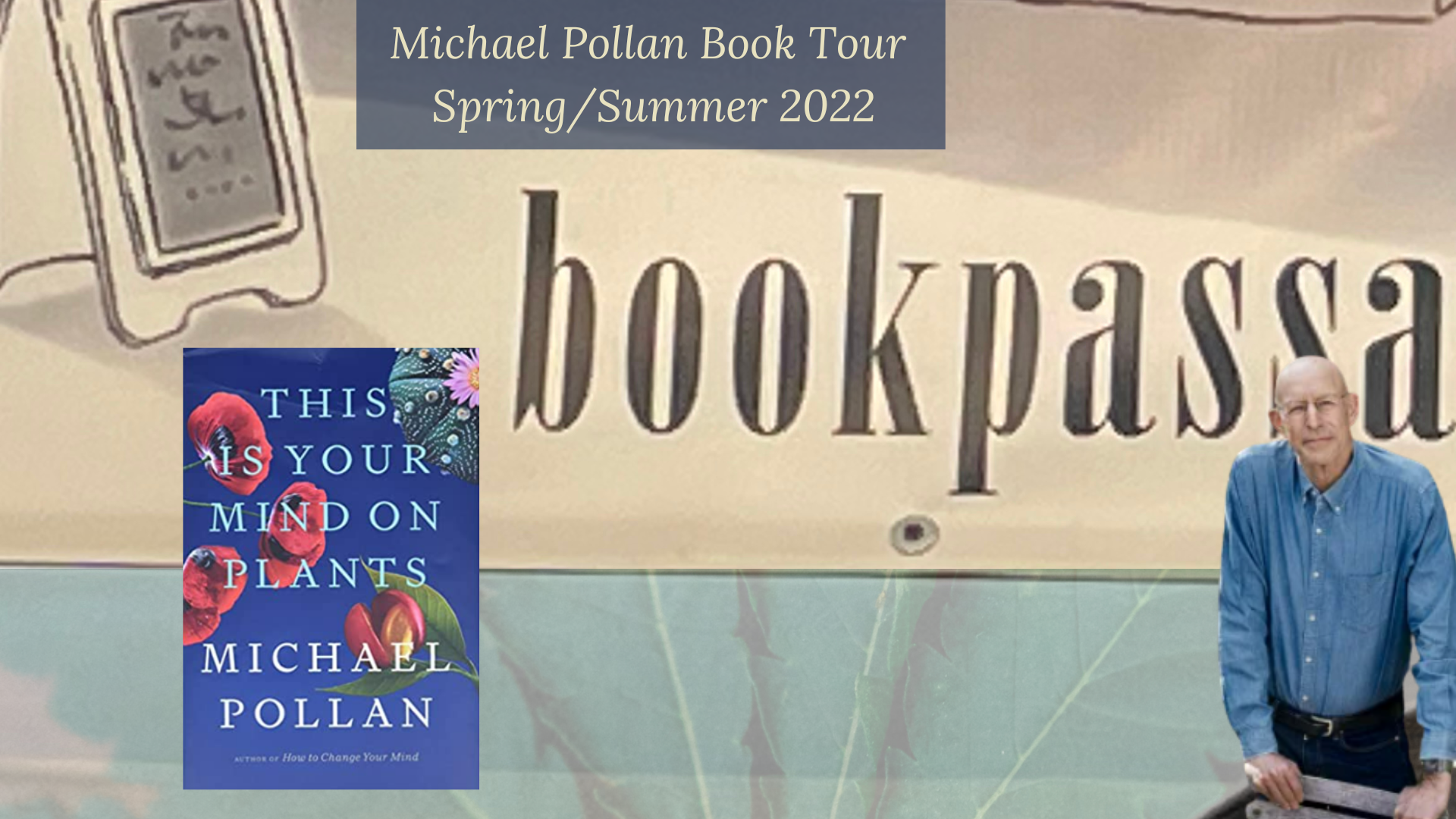
Pollan often uses coffee as an example. People around the world, regardless of culture, turn to caffeine to sharpen their minds. As a writer who has been on many deadlines over the years, I can vouch for coffee’s usefulness as I’m trying to get through a long night. How many times have I relied on coffee when pulling all nighters in college or in my career? No one would consider caffeine a drug; however, for we use it often and of course, it’s legal. He spoke of an article he wrote for Harper’s earlier on in his career on opium and while doing research, he discovered that making tea from the seed head of an opium poppy is a federal crime. In the video below, he shares some of his more humorous memories of that experience.
Those who follow Pollan’s work or have read his books, wouldn’t necessarily think of him as a writer who covers the “drug history.” After all, he’s mostly known for writing about the places where “nature and culture intersect: on our plates, in our farms and gardens, and in the built environment.” His most known books — The Botany of Desire and The Omnivore’s Dilemma — explore the socio-cultural impacts on food. During his interview at Book Passage with Mark Danner — a writer and educator who has covered foreign affairs, war, and politics for three decades — he spoke about how his latest book, This is Your Mind on Plants, was an attempt to go deeper than his original magazine article on opium he wrote nearly twenty five years ago.
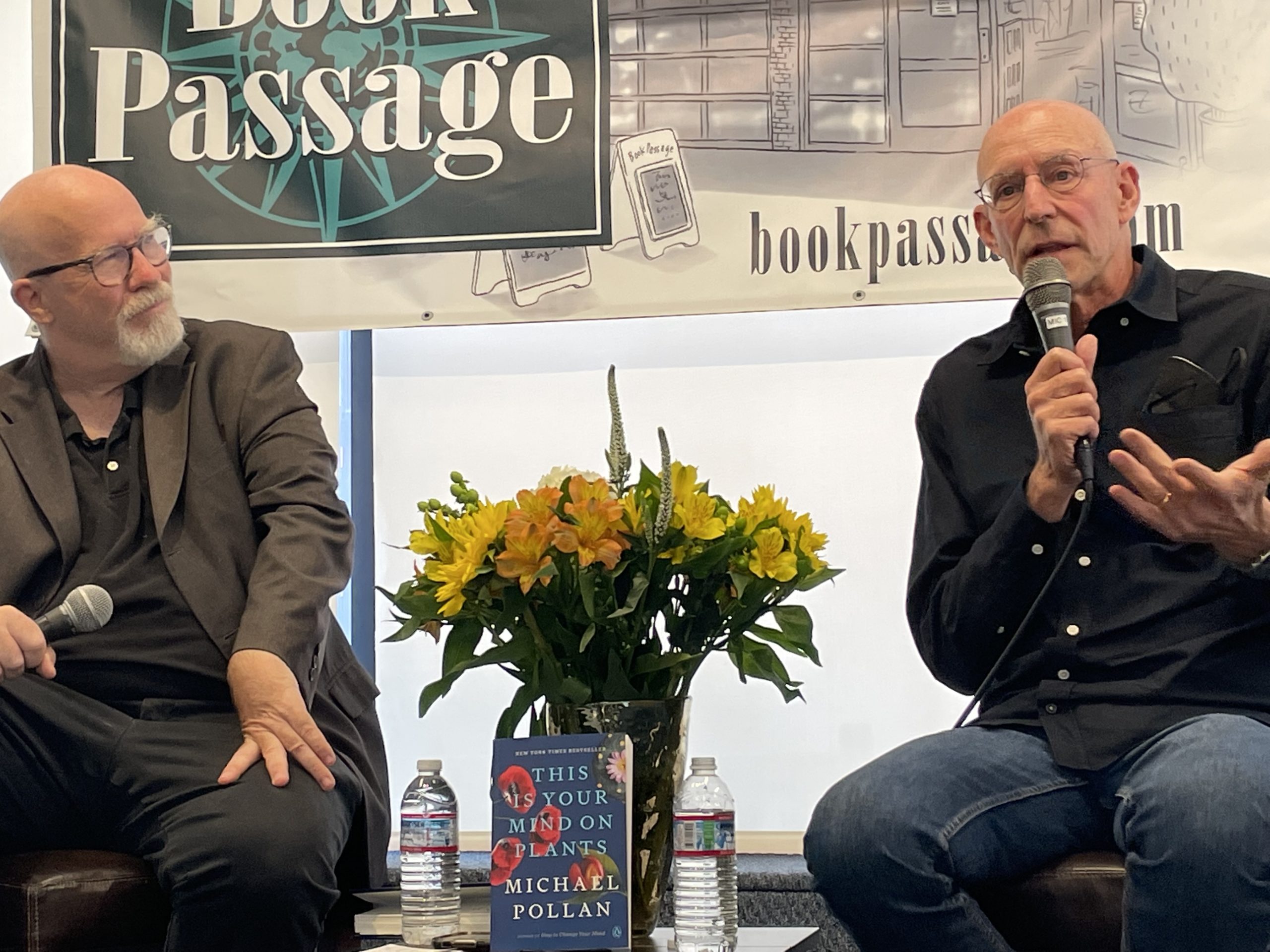
While the interview was much more expansive than his latest book’s unveilings, the two writers explored the three main plant drugs Pollan covers in the book: opium, caffeine, and mescaline. Times are changing and we all feel it. More than ever before, people are interested in mind-altering states as a way to shift (if not expand) our levels of consciousness.
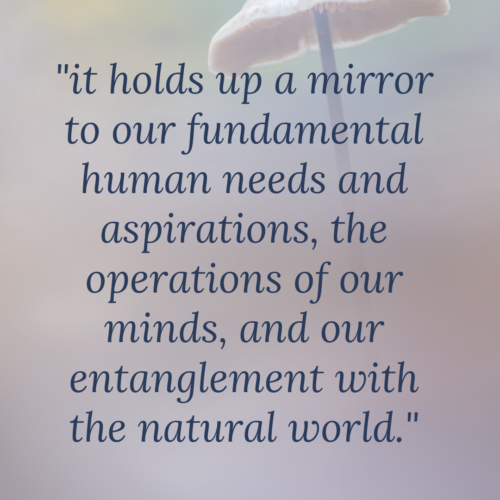 Despite humanity’s yearning for those deeper states of awareness, our societies have created fear and even laws around plant medicine that can take us there. As with anything, when over-used or abused, drugs can lead to illness or worst, death. That said, isn’t that also the case with alcohol, tobacco and pain medication we can get over the counter?
Despite humanity’s yearning for those deeper states of awareness, our societies have created fear and even laws around plant medicine that can take us there. As with anything, when over-used or abused, drugs can lead to illness or worst, death. That said, isn’t that also the case with alcohol, tobacco and pain medication we can get over the counter?
One of the things that Pollan demonstrates through his research and insightful reporting, is that when we use certain drugs to alter our minds, “we are engaging with nature in one of the most profound ways we can.” Says the book’s description of the books value: “it holds up a mirror to our fundamental human needs and aspirations, the operations of our minds, and our entanglement with the natural world.”
What I loved about the discussion is the refreshing observation that not only can it be useful for engaging with nature and I’d argue, other dimensional realities, but for psychological well-being. Pollan suggests that, “it does a reset and breaks through some of the unhealthy cycles where people may have lost hope.” This will lead to career opportunities as well, as the need for those who can administer therapeutic psychedelics, increases. Pollan says that the latest research out of MAPS—an organization aimed at healing and the overall well-being through psychedelic drug development, therapist training programs and sales, prioritizing public benefit above profit—suggests that we’ll need 100,000 trained facilitators. It shouldn’t be surprising to learn that Pollan is behind a center for Psychedelic Science & Public Education in Berkeley (launched in Sept 2020). According to an article in Berkeley News, $1.25 million in seed funding came from an anonymous donor, the proceeds of which will be used to “investigate cognition, perception and emotion and their biological bases in the human brain.”
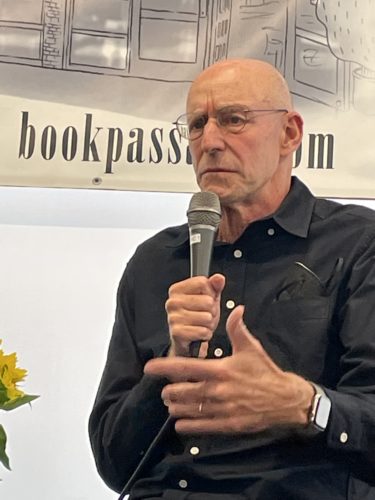 Mescaline, one of the drugs he covers in the books, apparently goes back 6,000 years when it was used by our indigenous elders. Unlike many other drugs, mescaline is roughly a 14 hour commitment. He says with a laugh, “When I was done with mescaline, it wasn’t done with me.” When he tried it out during the pandemic, he said that it didn’t send him to another planet in the cosmos like other drug experiences have done, but it glued him to the present moment. Adding more humor to the memory, he remembers staring at apricots for hours. Later, he added that “we need to explore its effects on neurons.”
Mescaline, one of the drugs he covers in the books, apparently goes back 6,000 years when it was used by our indigenous elders. Unlike many other drugs, mescaline is roughly a 14 hour commitment. He says with a laugh, “When I was done with mescaline, it wasn’t done with me.” When he tried it out during the pandemic, he said that it didn’t send him to another planet in the cosmos like other drug experiences have done, but it glued him to the present moment. Adding more humor to the memory, he remembers staring at apricots for hours. Later, he added that “we need to explore its effects on neurons.”
What will capitalism do to psychedelics along the way? He asserts that legislation and corporations will remove the psychedelic side effects of the drug (changing it in the laboratory not at the plant level) and they will also turn longer experiences into “bite-sized ones.”
Given that Pollan is the author of eight books, six of which have been New York Times bestsellers, the topic of writing in general also had to come up. For writers like me who have penned more than ten thousand articles and still struggle with the courage to get a book out the door, we look to visionaries like Pollan for insights. He says that he is not a natural storyteller. Yet, you need a narrative, so he often hangs it “off an experience.” For example, he says, “I like to write about ordinary things right in front of your face, like coffee.”
“I like to write about ordinary things right in front of your face, like coffee.” —Michael Pollan
A lot of his writing stems from his experiences in nature, particularly gardening. Although he fashions himself as a nature writer, he says that he’s never been an observer or spectator of nature, but one who loves to be in the trenches. Gardening of course is part of that. As for the book’s top take-aways? I’ve only read a few pages to-date, so stay tuned for more commentary on the other side. Below is a video snippet of some of the highlights of the interview.
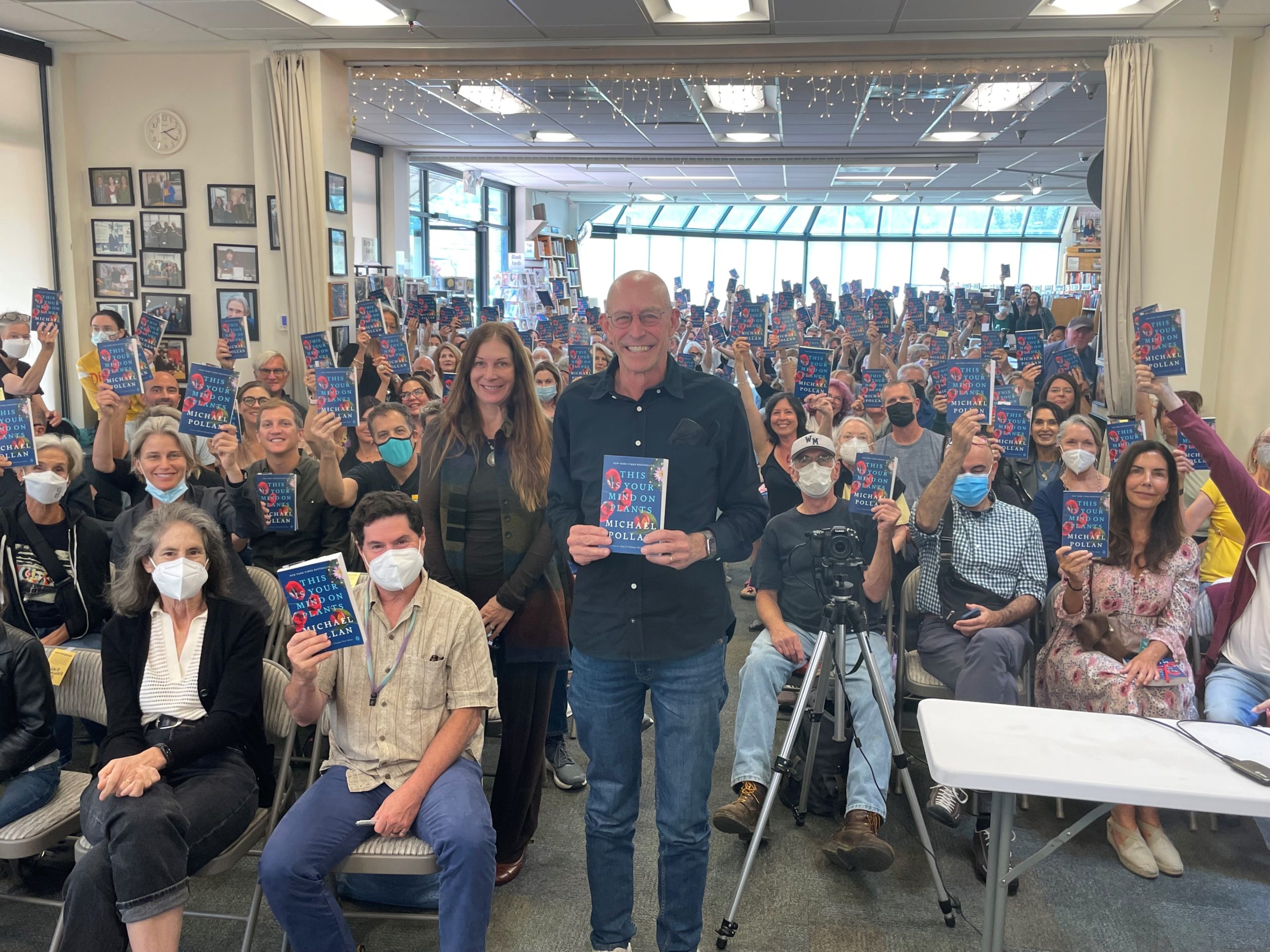
Video Recap

Renee Blodgett is the founder of We Blog the World. The site combines the magic of an online culture and travel magazine with a global blog network and has contributors from every continent in the world. Having lived in 10 countries and explored over 90, she is an avid traveler, and a lover, observer and participant in cultural diversity. She is also the founder of the Magdalene Collection, a jewelry line dedicated to women’s unsung voices and stories, and the award-winning author of the bestselling book Magdalene’s Journey
She is founder of Blue Soul Media and co-founder of Blue Soul Earth as well as the producer and host of the award-winning Blue Soul CHATS podcast, that bridges science, technology and spirituality. Renee also founded Magic Sauce Media, a new media services consultancy focused on viral marketing, social media, branding, events and PR. For over 20 years, she has helped companies from 12 countries get traction in the market. Known for her global and organic approach to product and corporate launches, Renee practices what she pitches and as an active user of social media, she helps clients navigate digital waters from around the world. Renee has been blogging for over 16 years and regularly writes on her personal blog Down the Avenue, Huffington Post, BlogHer, We Blog the World and other sites. She was ranked #12 Social Media Influencer by Forbes Magazine and is listed as a new media influencer and game changer on various sites and books on the new media revolution. In 2013, she was listed as the 6th most influential woman in social media by Forbes Magazine on a Top 20 List.
Her passion for art, storytelling and photography led to the launch of Magic Sauce Photography, which is a visual extension of her writing, the result of which has led to producing six photo books: Galapagos Islands, London, South Africa, Rome, Urbanization and Ecuador.
Renee is also the co-founder of Traveling Geeks, an initiative that brings entrepreneurs, thought leaders, bloggers, creators, curators and influencers to other countries to share and learn from peers, governments, corporations, and the general public in order to educate, share, evaluate, and promote innovative technologies.








